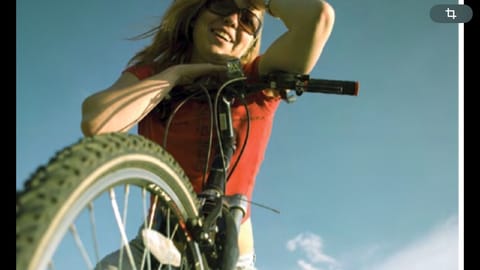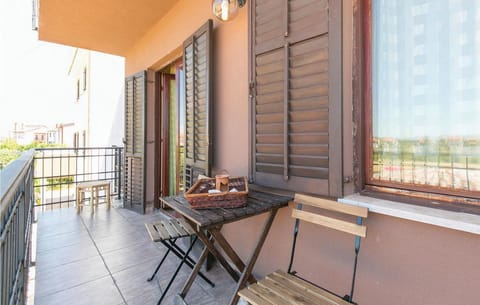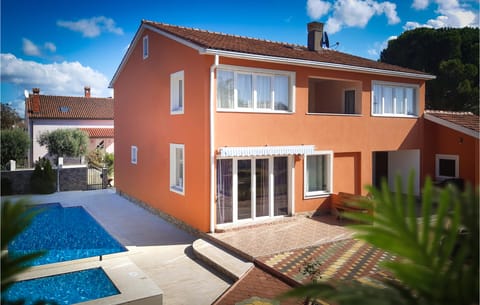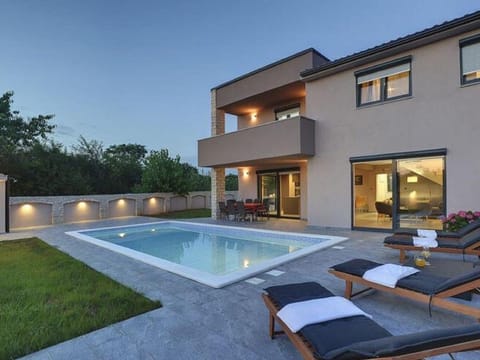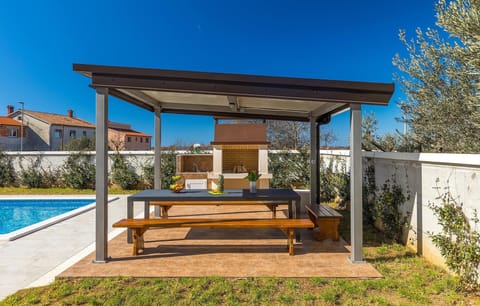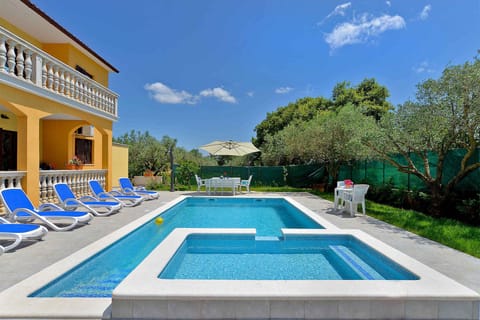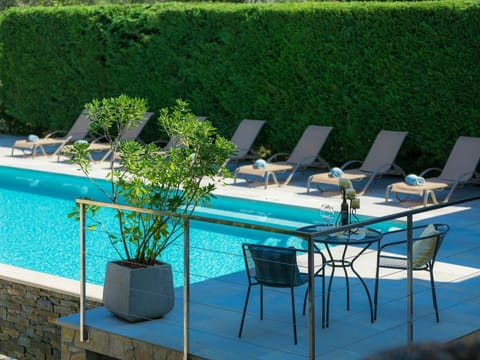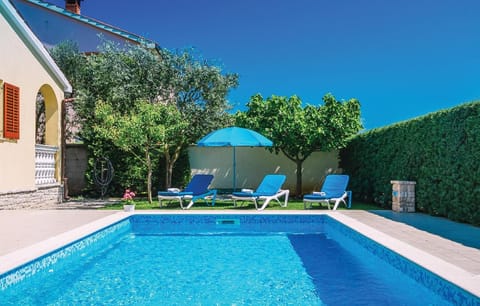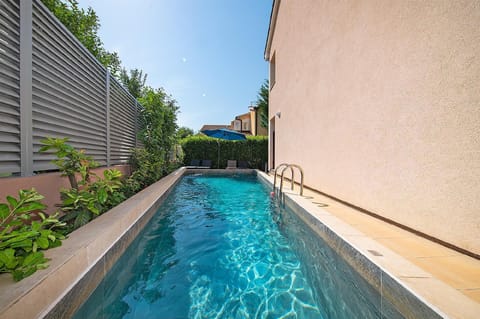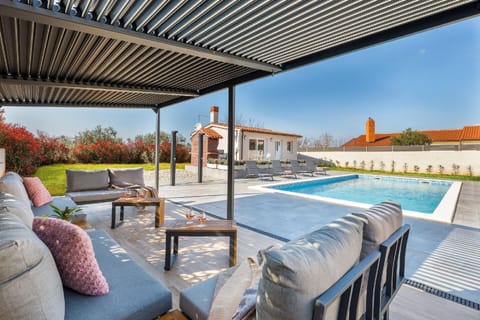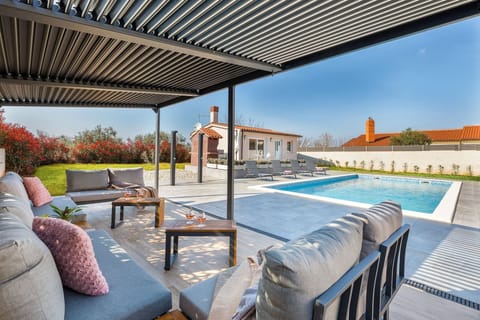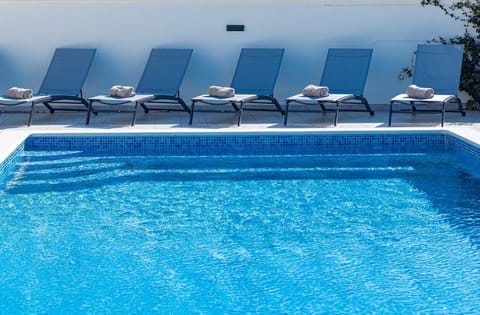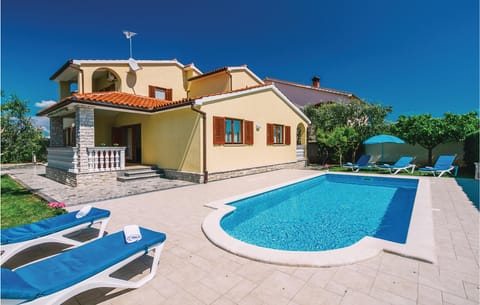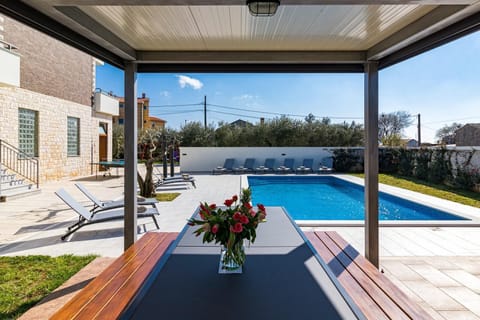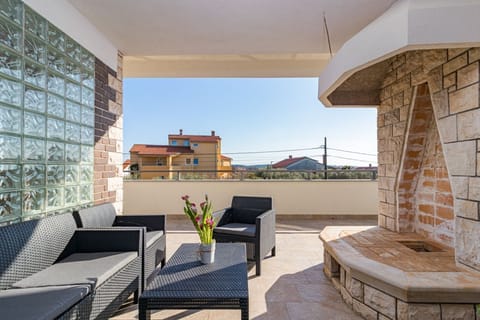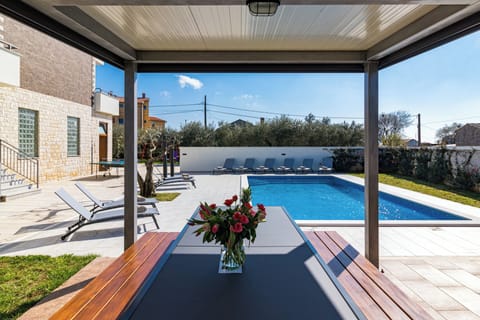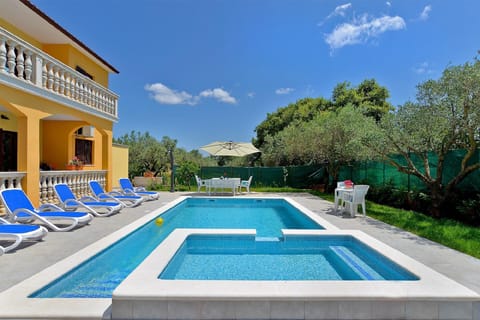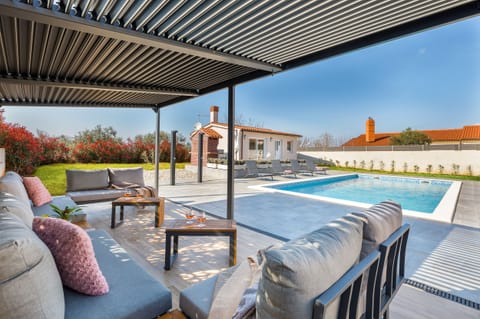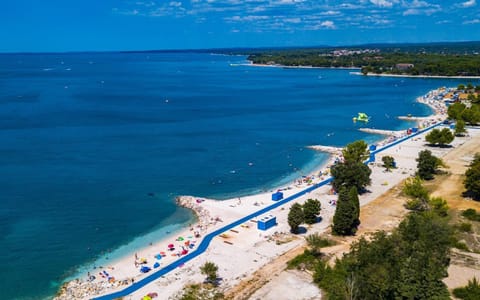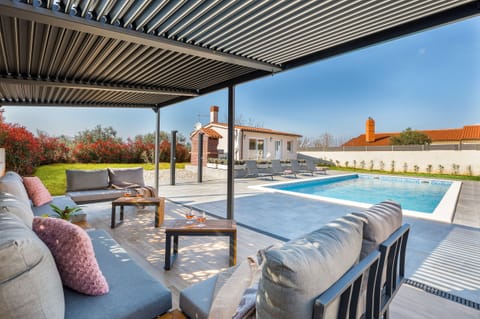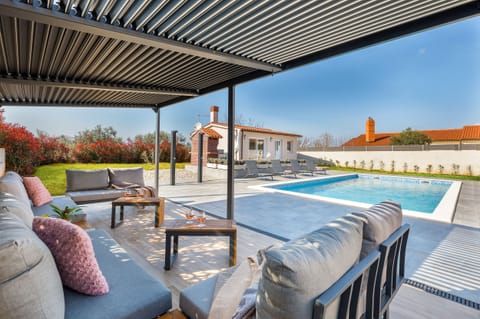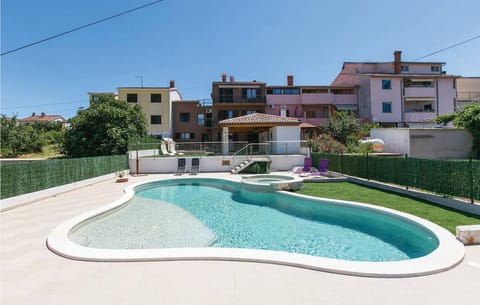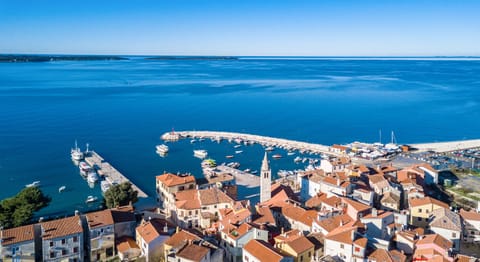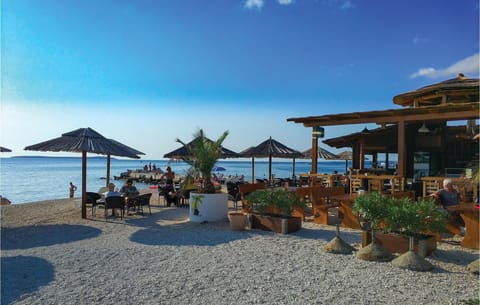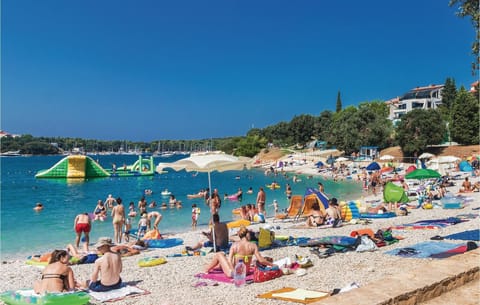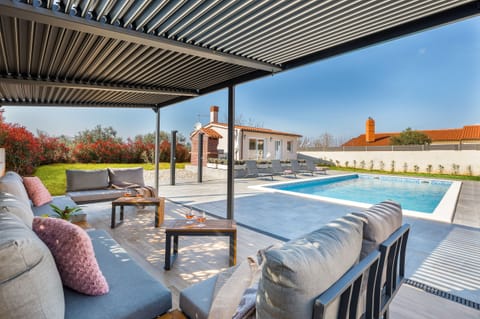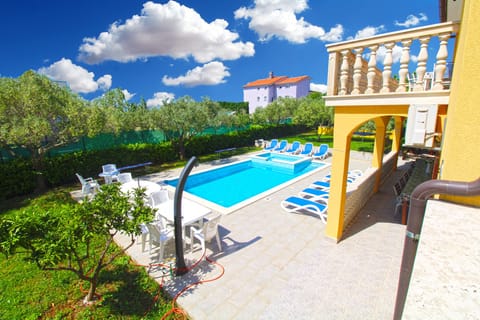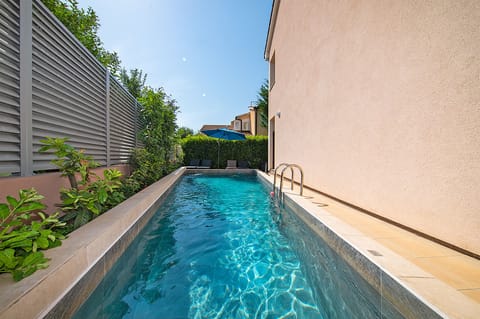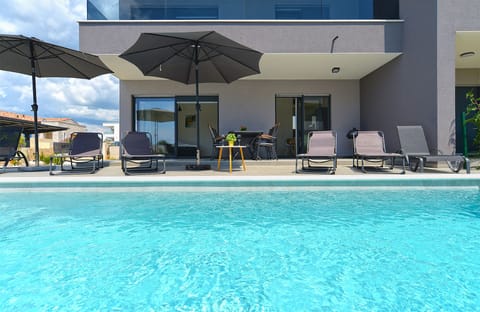Villa Lippa Peroj with a sea view welcomes you near Pola and NP Brioni.
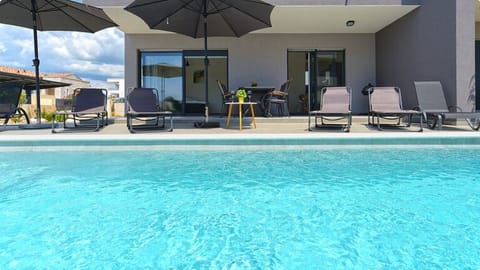
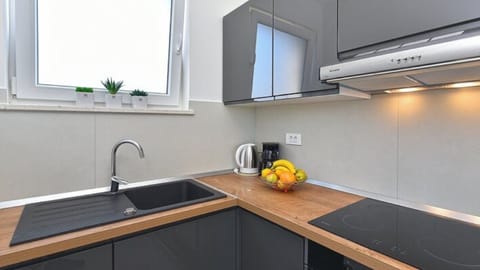
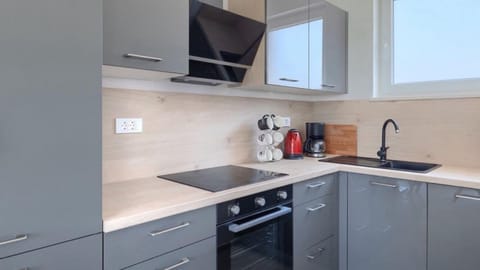
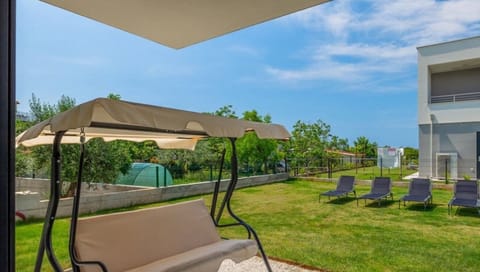
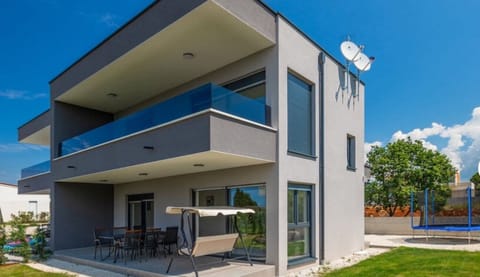
Villa in Fažana
12 guests · 4 bedrooms · 6 baths
Reasons to book
Top-tier experienceOne of the higher cost properties in the area
Includes essentialsAir conditioner, Internet / Wifi, Laundry and more
Book with confidenceWe partner with the top travel sites so you know you're getting a great deal on the perfect rental
About this villa rental
Villa Lippa Peroj with a sea view welcomes you in the small town of Peroj near Pula and National park Brioni. This modernly designed villa was made for a relaxed family vacation.
The outdoor area is perfect for refreshment on the covered terrace and enjoying the pool during summer time. The villa offers comfortable accommodation for up to 12 people in 4 bedrooms.
Guests are welcomed with a plate of meat cuts and grilled sea fish, you can saw it in category additional pictures.
Best places to see near Peroj are:
Brijuni is an archipelago and a national park in the Adriatic Sea, on the Croatian part of the Adriatic. They are located a few kilometers west of the Istrian coast, opposite the town of Fažana, and consist of 14 islands and islets with a total area of 33.9 square km (the area of the islands and the water area; the Brijuni water area accounts for 80% of the total area). The two largest islands are Veliki Brijun 7 km2 and Mali Brijun 1.7 km2, while the smaller ones are Sveti Marko, Gaz, Okrugljak, Šupin, Šupinić, Galija, Grunj, Vanga, Madona, Vrsar, Kozada and Sveti Jerolim.
The Pula Arena or Amphitheater in Pula is the largest and best-preserved monument of ancient architecture in Croatia. In terms of size, it ranks 6th among Roman amphitheatres in the world, and is the only one in the world whose three Roman architectural orders have been completely preserved. It was built in the 1st century, during the reign of Emperor Vespasian. 3000 years ago in the Arena, you could attend the popular gladiatorial fights that took place in the central flat area of the arena, and today most of the summer performances and concerts take place in the same place.
Forum Pula
The Temple of Augustus, the remains of the "Diana" temple, the Capitol and the Basilica, integrated into the medieval Communal Palace, is the most significant architectural complex of the historic core of Pula, the only one preserved in Croatia and very rare in Europe. The center of Roman cities consisted of forums dominated by temples and basilicas, and they were the most important city social space, a gathering place for citizens. The Pula Forum was divided into a lower plebeian part and a higher patrician part - the raised plateau around the temples. During the Roman Republic, the Forum was dominated by the Capitoline Temple, probably dedicated to the god Hercules, the patron of Pula, and the Basilica, which integrates the functions of the judiciary, administrative activities and commerce. In the time of Emperor Augustus, twin temples were built next to the Capitol and the Basilica, in the east the so-called "Temple of Diana", and to the west the Temple of Augustus, built between the 4th and 14th AD. Next to the Forum, at the end of the climb (clivus) leading to the fortress (castrum), there was a treasury (aerarium). A special meaning and value is given to this space by more than two millennia of uninterrupted development of the most important function in one place.
Triumphal Arch of Sergius
One of the most preserved and certainly the most beautiful ancient monuments of our city is located in the very center. It is the Arch of Sergius, or as we Puglia people call it the "Golden Gate", because it abutted the city gate (Porta Aurea), so named because of the richness of the decorative arch or because of the gilding of the doorposts. Those gates and ramparts were demolished at the beginning of the 19th century, by the decisions of the city's gang leaders at the time, due to urbanization and the expansion of the city outside the ramparts.
Riva Fazana
Today, the port and waterfront represent a beautiful stage where numerous cultural and musical manifestations and folk festivals are held during the summer - especially the "Sardine Festival". But, apart from its fishing tradition, Fažani is known for its autochthonous wine and olive oil. In many local restaurants, guests can taste excellent fish and meat, authentic local food served with Istrian Malvasia. Visitors can take a walk along the Fažana riviera, beaches, ride through numerous cycling routes, play golf, enroll in a windsurfing school and attend local events. Fažana, enriched with natural beauty, offers a relaxing atmosphere for every guest.
The outdoor area is perfect for refreshment on the covered terrace and enjoying the pool during summer time. The villa offers comfortable accommodation for up to 12 people in 4 bedrooms.
Guests are welcomed with a plate of meat cuts and grilled sea fish, you can saw it in category additional pictures.
Best places to see near Peroj are:
Brijuni is an archipelago and a national park in the Adriatic Sea, on the Croatian part of the Adriatic. They are located a few kilometers west of the Istrian coast, opposite the town of Fažana, and consist of 14 islands and islets with a total area of 33.9 square km (the area of the islands and the water area; the Brijuni water area accounts for 80% of the total area). The two largest islands are Veliki Brijun 7 km2 and Mali Brijun 1.7 km2, while the smaller ones are Sveti Marko, Gaz, Okrugljak, Šupin, Šupinić, Galija, Grunj, Vanga, Madona, Vrsar, Kozada and Sveti Jerolim.
The Pula Arena or Amphitheater in Pula is the largest and best-preserved monument of ancient architecture in Croatia. In terms of size, it ranks 6th among Roman amphitheatres in the world, and is the only one in the world whose three Roman architectural orders have been completely preserved. It was built in the 1st century, during the reign of Emperor Vespasian. 3000 years ago in the Arena, you could attend the popular gladiatorial fights that took place in the central flat area of the arena, and today most of the summer performances and concerts take place in the same place.
Forum Pula
The Temple of Augustus, the remains of the "Diana" temple, the Capitol and the Basilica, integrated into the medieval Communal Palace, is the most significant architectural complex of the historic core of Pula, the only one preserved in Croatia and very rare in Europe. The center of Roman cities consisted of forums dominated by temples and basilicas, and they were the most important city social space, a gathering place for citizens. The Pula Forum was divided into a lower plebeian part and a higher patrician part - the raised plateau around the temples. During the Roman Republic, the Forum was dominated by the Capitoline Temple, probably dedicated to the god Hercules, the patron of Pula, and the Basilica, which integrates the functions of the judiciary, administrative activities and commerce. In the time of Emperor Augustus, twin temples were built next to the Capitol and the Basilica, in the east the so-called "Temple of Diana", and to the west the Temple of Augustus, built between the 4th and 14th AD. Next to the Forum, at the end of the climb (clivus) leading to the fortress (castrum), there was a treasury (aerarium). A special meaning and value is given to this space by more than two millennia of uninterrupted development of the most important function in one place.
Triumphal Arch of Sergius
One of the most preserved and certainly the most beautiful ancient monuments of our city is located in the very center. It is the Arch of Sergius, or as we Puglia people call it the "Golden Gate", because it abutted the city gate (Porta Aurea), so named because of the richness of the decorative arch or because of the gilding of the doorposts. Those gates and ramparts were demolished at the beginning of the 19th century, by the decisions of the city's gang leaders at the time, due to urbanization and the expansion of the city outside the ramparts.
Riva Fazana
Today, the port and waterfront represent a beautiful stage where numerous cultural and musical manifestations and folk festivals are held during the summer - especially the "Sardine Festival". But, apart from its fishing tradition, Fažani is known for its autochthonous wine and olive oil. In many local restaurants, guests can taste excellent fish and meat, authentic local food served with Istrian Malvasia. Visitors can take a walk along the Fažana riviera, beaches, ride through numerous cycling routes, play golf, enroll in a windsurfing school and attend local events. Fažana, enriched with natural beauty, offers a relaxing atmosphere for every guest.
Amenities
Air conditioner
Internet / Wifi
Laundry
Map of Fažana
RRRR
FAQs
How much does this villa cost compared to others in Fažana?
The average price for a rental in Fažana is R 1,988 per night. This rental is R 4,183 above the average.
Is parking included with this villa?
Parking is not specified as an available amenity at Villa Lippa Peroj with a sea view welcomes you near Pola and NP Brioni.. For more information, we encourage you to contact the property about where to park.
Is there a pool at this villa?
We didn’t find pool listed as an amenity for this villa. It may be worth double checking if a pool is important for your stay.
Is Villa Lippa Peroj with a sea view welcomes you near Pola and NP Brioni. pet friendly?
Unfortunately, this villa is not pet-friendly. Try searching again and filter for "Pets Allowed"
What amenities are available at Villa Lippa Peroj with a sea view welcomes you near Pola and NP Brioni.?
We found 3 amenities for this rental. This includes air conditioner, internet / wifi, and laundry.
Explore similar vacation rentals in Fažana
Explore all rentals in FažanaFažana travel inspiration
Read our blogGuides
Best East Coast Beaches and Getaway Locations You Can’t Miss
Budget Travel
7 Most Affordable Snowbird Destinations for 2025
Guides
Top Activities to Try in Panama City Beach, Florida
Guides
Top Things to Do in Gulf Shores, Alabama: Adventure and Fun Await
Local Culture
Exploring Miami’s Wynwood District: Street Art, Food, and More
Guides
Fun Things to Do in Ocean City, Maryland
Local Culture
A Foodie’s Guide to the Best Dining in Orlando, Florida
Guides
Top Things to Do in Oahu and Honolulu
